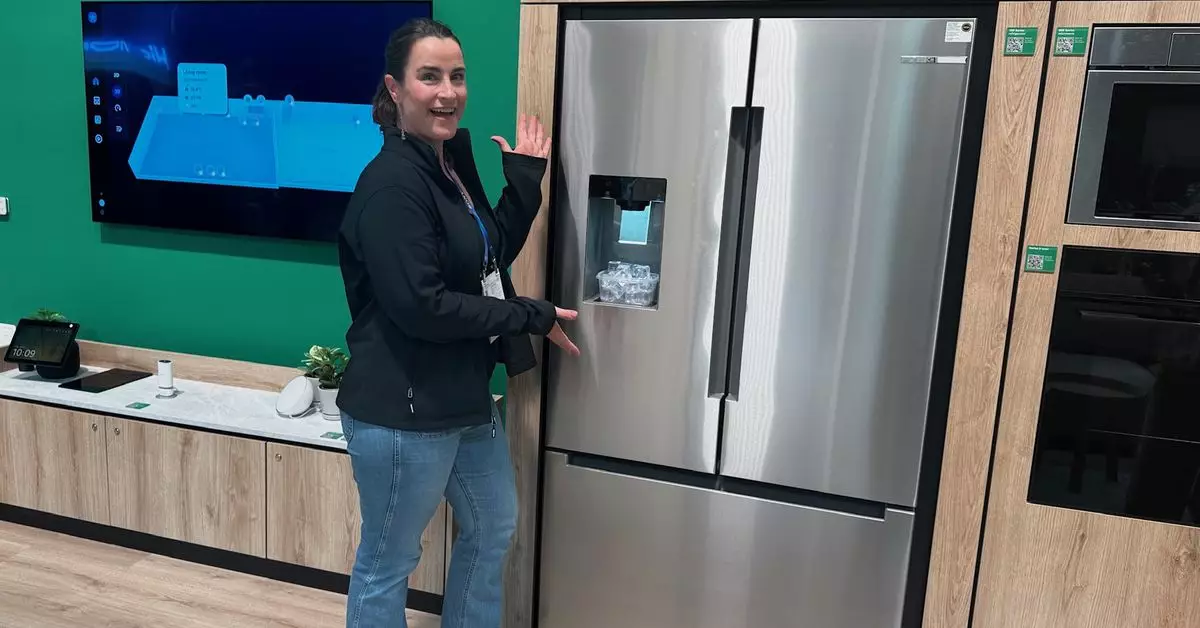In the fast-evolving landscape of smart home technology, interoperability remains a significant challenge. This week at CES, Bosch, a longstanding name in home appliances, unveiled its first Matter-enabled product—the 100 Series French Door Bottom Mount Refrigerator. This major leap forward marks the integration of a smart home standard that promises more efficient and secure communication between connected devices.
Launched in November, the 100 Series refrigerator is set to hit the U.S. market by spring, with a price tag of $2,500. At the core of this appliance is a dedicated chip that supports Matter, a smart home interoperability standard designed to unify various connected devices. As Eelco Lammertink from BSH (Bosch, Siemens, Thermador, and Gaggenau) explained, a firmware update scheduled for this summer will enhance the fridge’s compatibility, further extending its functionalities.
The announcement of the 100 Series aligns well with current trends, as manufacturers are increasingly recognizing the need for devices that communicate seamlessly with each other. Matter not only simplifies ownership for users but also fosters a broader environment of IoT synergy.
Matter functions as a common language for smart devices, facilitating local communication without reliance on cloud infrastructures. This means that users can control their appliances directly through their preferred ecosystem, resulting in faster response times and enhanced security. In essence, Matter turns smart homes into interconnected systems where various devices—from lighting and thermostats to large appliances like refrigerators and dishwashers—can work collectively.
While other smart fridges provide basic remote functionalities, such as temperature adjustments and notifications when the door is left ajar, the implementation of Matter elevates these features. Users may soon find their smart speakers announcing important alerts, offering a centralized interaction with their home ecosystem.
Bosch’s plans do not end with the 100 Series. Lammertink indicated ambitions to bring Matter support to all its appliance lines progressively. This could have sweeping implications for consumers, who may soon expect to manage multiple appliance categories—refrigerators today, with dishwashers and others to follow. However, the rollout will be staged, with one line of appliances gaining Matter compatibility this year and additional categories extending to 2026.
A highlight feature of the planned upgrades is energy management capabilities. By incorporating energy reporting, the refrigerator will align with broader home energy management systems. This enhances sustainability efforts and represents a step toward more intelligent energy consumption at home. Nevertheless, Bosch’s plans to limit retrofitting existing appliances with Matter support drew disappointment from some users, highlighting the technical challenges involved in upgrading older models. As Lammertink noted, the risks of ‘bricking’ existing devices are too significant to navigate lightly.
It’s important to note how Matter stands out in a crowded marketplace filled with proprietary ecosystems from tech giants like Apple, Amazon, Google, and Samsung. Thus far, smart home platforms like Samsung SmartThings and Home Assistant have embraced Matter, with Amazon expected to join this year. However, uncertainty persists regarding potential support from Google Home or Apple Home.
In the rapidly advancing smart home sector, the introduction of Matter offers an avenue for achieving true connectivity among environment-friendly, internet-based appliances. As manufacturers like Bosch pivot towards this standard, consumers will benefit from improved user experience, which promises not only convenience but also enhanced security and data awareness within their living spaces.
The unveiling of Bosch’s Matter-enabled refrigerator at CES signifies not just an innovative product, but a shift in how we interact with technology in our homes. As companies strive for harmonization among devices, the convergence of smart home technology looks promising. The move towards adopting Matter standards may well redefine user interaction with, and expectations of, household appliances in the years ahead. With Bosch leading the charge, consumers are likely to witness a more integrated and responsive smart home ecosystem unfolding, paving the way for smarter living.


Leave a Reply